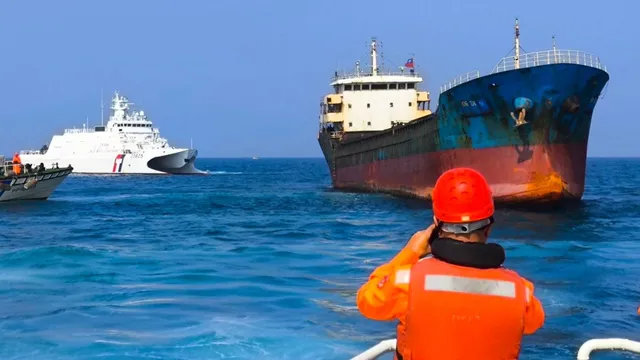
Chinese-crewed ship held for severing Taiwan's undersea cable
2025-02-25 11:58- Taiwan's coast guard intercepted the Hongtai, a Togolese-flagged ship, thought to have damaged an undersea communications cable.
- The Taiwanese authorities are investigating the ship's crew, all of whom are Chinese nationals, under national security principles.
- This incident contributes to heightening tensions between Taiwan and China, amid fears of potential sabotage.
Express your sentiment!
Insights
Taiwan is currently facing increased tensions with China, following an incident involving the Hongtai, a Togolese-flagged cargo ship. Taiwanese authorities were alerted to the severing of an undersea communications cable by Chunghwa Telecom, located approximately 6 nautical miles northwest of Jiangjun Fishing Harbor. The coast guard detected that the Hongtai had been anchored in the vicinity prior to the cable break and had not responded to multiple requests from local authorities to establish communication. The situation escalated when Taiwanese coast guard personnel intercepted the ship, which, after being approached, began to sail northwest. Upon establishing contact, the coast guard escorted the Hongtai to Anping Port for further investigation. Reports specify that the entire crew of eight was identified as Chinese nationals, and their detention is being processed under national security protocols. In the investigation, authorities are tasked with determining the cause of the cable's severing—whether it resulted from intentional sabotage or a mere accident. They have not ruled out the possibility that this incident could be part of a broader strategy of gray-zone incursions influenced by China, which has increasingly been associated with such maritime operations. Previous incidents have seen similar severing of undersea cables, causing communication disruptions, and Taipei has in some cases, attributed these incidents to Chinese involvement. Interestingly, despite the damage to the undersea cable, communications on the Penghu Islands remained unaffected due to the timely activation of a backup cable by Chunghwa Telecom. This incident signals a continuation of tensions between Taipei and Beijing, exacerbated by China's ongoing claims over Taiwan and its peripheral regions. The response from a Chinese Foreign Ministry spokesperson suggested a lack of knowledge regarding the event and dismissed its relationship with diplomatic matters, indicating a complex geopolitical landscape surrounding Taiwanese sovereignty and security.
Contexts
Gray-zone strategies have become increasingly prominent in the context of China's approach towards Taiwan, especially as cross-strait tensions have escalated in recent years. These strategies typically fall within the spectrum of coercive tactics that fall below the threshold of traditional military conflict. They aim to achieve political and territorial objectives while simultaneously maintaining plausible deniability, thereby complicating international responses. China's activities encompassing this gray-zone warfare include cyber operations, disinformation campaigns, economic coercion, and the use of maritime militia to assert claims in the Taiwan Strait and surrounding waters. The objective behind these measures is to undermine Taiwan's sovereignty, sow discord among its population, and deter any movements toward formal independence, thereby reinforcing a narrative of China's territorial integrity without triggering outright military engagement. Cyber operations represent a significant aspect of China's gray-zone strategy. These operations often target Taiwanese government institutions, businesses, and public sentiment through hacking, data leaks, and other forms of cyber intrusions intended to disrupt day-to-day operations and instill a sense of insecurity among the Taiwanese populace. Concurrently, disinformation campaigns play a crucial role in the gray-zone tactics employed. By spreading misinformation and manipulating social media narratives, China seeks to create confusion and polarize Taiwanese society, ultimately aiming to diminish the credibility of the current government and sow doubt regarding Taiwan's future as an independent entity. Economic measures have also been utilized to pressure Taiwan into compliance. This includes leveraging China’s significant economic influence over Taiwan, such as restricting exports or undermining Taiwan's trade relationships with other countries. These economic tactics aim to create dependency and force Taiwan to consider closer ties with Beijing, ultimately aligning with China's broader strategy for reunification. The presence of the maritime militia is particularly noteworthy; by employing civilian vessels for coercive purposes, China blurs the line between state military and civilian action, complicating Taiwan's defense posture and creating a challenging environment for international maritime operations in the region. In conclusion, China's gray-zone strategies against Taiwan represent a multifaceted approach that aims to achieve strategic objectives without crossing the line into open conflict. The implications of these tactics extend beyond Taiwan, affecting the security dynamics of the broader Asia-Pacific region and challenging the response strategies of other nations, particularly the United States and its allies. Understanding and addressing these gray-zone strategies is crucial for the preservation of Taiwan's sovereignty and regional stability, necessitating close monitoring and a unified response from the international community.